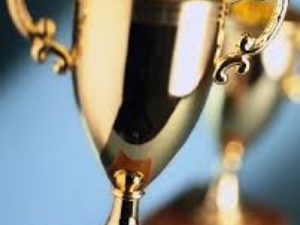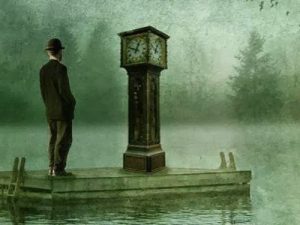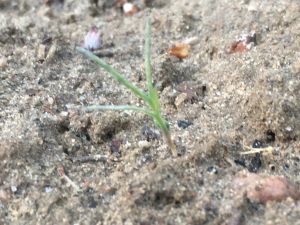THE WAitING IS THE HARDEST PART
So much of life is spent doing it. Waiting. For our turn in line. For an appointment. For that check. For the workday to end. For the phone to ring. For Christmas morning. For dinner to be ready. For the first day of school. For our date to arrive. For the end of class. For the right romantic partner to show up. For test results. For our big break. For answers.
My father, a master of etymology, taught me at an early age that patience comes from the Latin verb patior, which means “to suffer.” Being patient can be painful. Tom Petty summed it up beautifully: “The waiting is the hardest part.” And it’s a bit of a mystery why it’s such a prevalent part of life.
In the most developed nations, we’ve been trained to expect everything—from oatmeal to email—instantly. But no matter how fast or how far technology develops, there are lots of things that can’t be rushed. True friendship. Trust. Real love. Great food. The growth of a plant. Building a home. Learning a language or skill. Writing a book or a song. Training for an athletic event. Climbing a mountain. Recovering from an injury. Realizing a dream.
A few years ago, I injured my left shoulder and wound up losing over 75% of my range of motion. I had developed “frozen shoulder,” a condition that would take at least one year (and possibly three) to heal. This happened right when I was about to make some very significant moves forward in my career. Instead, I was incapacitated, irritated and in pain. Money that had been put aside for recording was being spent on medical bills.
I could have spent a lot of time and energy howling at the moon, railing against the injustice of it all and poisoning my attitude toward life. Fighting would get me nowhere. The only real option I had was to wait it out. My choice was whether I would do so gracefully or not. So I chose to accept what was. Not worry about how long it would take or what kinds of lost opportunities this would cause or how far behind (professionally and financially) this would put me. I chose to focus on what I could accomplish with the limitations I had. I chose to trust in the process—however absurd it seemed—and to believe that there was something to be learned in this experience.
Patience is a test of character. It teaches us acceptance—of ourselves, others and of situations beyond our control. It helps us avoid big mistakes. It keeps us from giving up too soon. Or jumping the gun. It strengthens our resolve. Our trust in the perfect unfolding of things—in the perfect way and at the perfect time.
Life isn’t about reaching a destination. If we focus only on the outcome, we miss the beauty and joy and wonder of the journey itself.
THE POWER OF INTUITION
“The intuitive mind is a sacred gift and the rational mind is a faithful servant. We have created a society that honors the servant and has forgotten the gift.” — Albert Einstein
Instincts are primitive. They’re vital. They’re powerful. They provide critical information. They’re what enable all creatures to survive. They make it possible for all living beings to find food and shelter, perpetuate their species and—most important of all—escape danger. When animals fail to pay attention to their instincts, they die.
We’ve been raised in a culture that values intellect over intuition. But our “gut” tends to be more intelligent than our brain. It has access to information that our mind doesn’t—and processes it at lightning speed. Somehow it detects, even in an instant, whom we should and shouldn’t trust, what we should and shouldn’t choose, where we should and shouldn’t go.
Virtually every single regret I’ve ever had I can attribute to not having listened to my gut. That very real sensation that shows up somewhere in the abdominal region. I imagine it feels different to everyone, but for me, it’s a subtle, persistent sense of dread.
I’ve ignored it. Doubted it. Argued with it. Mocked it. Dismissed it. Overridden it. Stifled it. Buried it. And it has always, always led to regret. Not to mention post facto being required to listen to that little internal voice saying, “I told you so.”
We know—even though we don’t know how we know. And that’s kind of weird. Which is why we’re reluctant to believe it when our gut starts acting up. Instead, we start rationalizing with ourselves: “That’s just my fear talking,” we say. At least I do.
I’ve wasted more time than I’d care to admit in relationships which I “knew”—out of the gate—were wrong for me. I’ve taken on clients whom I had a “feeling” were bad news. Why? Because I didn’t trust my instincts. I second-guessed my intuition. I convinced myself that I couldn’t possibly “know” so soon and that I needed to give that person or situation a chance. Most important, I’ve spent years doing work that wasn’t my real passion and avoiding what—in my heart of hearts—I knew I was here to do.
So, how can we know if that bad feeling is really our intuition or simply fear? How can we be sure if our excitement about someone or something is just wishful thinking or really our gut pointing us toward what’s in our best interest? How can we tell when we need to do an about-face or forge ahead? It’s about becoming familiar with that internal voice—one that’s as unmistakable as the voice of a family member, lover or friend. And consciously choosing to listen to it. It’s there to guide and protect us.
“Intuition is always right in at least two important ways: It is always in response to something. It always has your best interest at heart” — Gavin de Becker
Have the courage to follow your heart and intuition. They somehow already know what you want to become.” — Steve Jobs
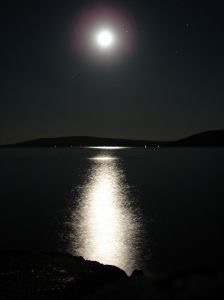
WAitING FOR SPRING
My muscles still carry the memories of all the digging. The bending and lifting and carrying. The planting and the sowing. The fall hours on my knees as if praying for the earth to bring forth a miracle.
Winter comes. Slowly, the cold and snow and darkness leave. The light returns.
But it seems as though nothing’s changed. The ground looks hard and cracked and barren. I wait. And wait. And wait. Wondering if my labor was in vain. An exercise in futility. Thinking that maybe the seeds were bad. Or that I put them in the wrong place. Or that I have no talent for gardening. And that all I will ever have is a bed of brown dirt.
Then, one day, as I peer into the expanse of muddy nothingness, I see it. It’s so small I almost miss it. The tiniest wisp of green, like a single hair sprouting from the scalp of the earth. And the next day, there’s another. Signs of life. And my doubt shifts to hope. To expectation. To certainty. That in just a little while longer, a bud will emerge. And that bud will turn into a blossom.
And this is how it is with other kinds of seeds. Whatever we create. Whatever we invest our time and energy and resources in. Whether it’s a song or a film, a book or a painting, a product or a program—if we’ve done the work, we just need to keep believing. And wait for spring.
HOW BIG IS YOUR BRAVE?
“Courage is being scared to death…and saddling up anyway.” — John Wayne
Sara Bareilles is a remarkably talented musician and songwriter. Her last hit “Brave,” an inspiring song—for which there is a highly infectious, put-a-huge-smile-on-your-face video—is all about being honest and real and taking a stand for who you are.
It got me thinking about what being brave is. I bump into fear (ranging from garden-variety anxiety to full-throttle panic) constantly as a writer, as a performer—and as a human being. There are all kinds of things that I put off doing simply because I’m afraid. Afraid of being judged. Afraid of other people’s opinions. Afraid of making mistakes. Of being rejected. Of failing.
Courage is about doing–or saying–the thing that matters to our innermost being. It’s the willingness to overcome fear of whatever we need—or want—to do.
Acts of courage come in all forms. It could be jumping out of an airplane or tackling a double-black-diamond ski run. It could be putting ourselves in harm’s way. It could be asking someone out on a date or performing a new song. It could be speaking the truth. Stating an opinion. Asking a favor. Revealing a secret. Admitting a mistake. Standing up against injustice. Making the choice to go for what we really want in life. Saying yes. Or saying no.
Bravery is relative. What requires courage from me may be the easiest thing in the world for you. But in order for something to be courageous, it requires feeling fear. Nelson Mandela said, “I learned that courage was not the absence of fear, but the triumph over it. The brave man is not he who does not feel afraid, but he who conquers that fear.”
Though I knew very clearly as a young teen what I wanted to do in life, I wound up believing that I couldn’t or shouldn’t. There was a lot of pressure to pursue a more secure, traditional career path. So I did. I reached a point, however, of no longer being able to deny who and what I was. It was terrifying—and liberating—to embrace being a musician and songwriter and to go for what I truly wanted instead of pursue what I thought I “should” do.
Being authentic, being true to our highest self, requires courage. Courage is living from the inside—out. Not buckling under the pressure to conform or caving into someone else’s expectations.
It’s only in facing our fears that we grow. Doing the thing we’re scared of is what allows us to develop confidence and become stronger. It helps us realize that we’re capable of more than we think. It’s how we make our dreams reality and step into our true potential. One step at a time.
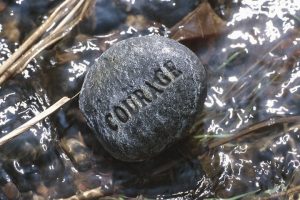
YOU CAN’T WIN IF YOU Don’T play
Winners. They all have different backgrounds and come from different places. Maybe they won on their first try. Maybe they’d been at it for years. Either way, the two—perhaps only—things they have in common are: They believed winning was possible. They were in the game.
Many of my friends are songwriters and artists. We have similar goals. Thanks to Facebook, I get a play-by-play of their accomplishments. There are days when I feel myself turning what is undoubtedly some very unattractive shade of green. I admit that I envy them for their successes, however big or small. How did they get that gig, get that placement, get that cut, get on the charts, get that award…? Why haven’t I?
And then it dawned on me. Some of the things they were achieving, I was only dreaming about. I wasn’t acting. I was sitting on the sidelines. I was watching the game, but I wasn’t fully in it. I wasn’t actively placing bets on my talent or my ability to achieve my dreams.
It wasn’t until I had this realization that I mustered up the courage to enter an international songwriting contest. I took a risk and put my \entry-fee dollars on two of my songs. On one level, it felt like gambling. What did I stand to lose? Some non-disposable income and a little pride. But for one moment, minutes before the deadline, I ignored the odds and believed winning was possible.
Months later, I got the news that one of the songs had been selected as one of the winners. The other was chosen as a finalist.
But nothing might have happened—as it often does. What then? Curiously, it’s those who are determined to stay in the game who wind up defying the odds. Not playing, in fact, guarantees not winning. “Often the difference between a successful person and a failure is not one has better abilities or ideas, but the courage that one has to bet on one’s ideas, to take a calculated risk – and to act.” Andre Malraux
Do you have big dreams? Dreams you’re afraid to pursue because the odds are bad? Slim to none? Doing what you feel is the truest expression of who you are is never about the odds. Or the outcome. It’s about integrity. It’s about alignment between desire and action.
If we’re not pursuing our dreams, we’re essentially giving up on them. Tacitly, we’re saying that we—or they—don’t stand a chance. Never having tried, however, is much more difficult to live with than trying and losing.
What would you like to see happen in your life? What’s the next step toward realizing that goal? Is the risk of losing greater than the risk of never having given yourself a chance to win?
Make that move. Whatever the outcome, one thing’s for sure: You can’t win if don’t play.
